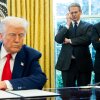Tariffs create tough choices for car shoppers : NPR

A pickup truck is raised for display at a car dealership in Alhambra, California, on March 27, 2025. After President Trump announced significant tariffs on imported vehicles and parts, automaker stocks fell sharply. But sales at dealerships rose, at least in the short-term, as buyers try to get ahead of the anticipated price spikes in the coming months.
Frederic J. Brown/AFP via Getty Images
hide caption
toggle caption
Frederic J. Brown/AFP via Getty Images
The threat of tariffs has triggered something of a gold rush on America’s auto lots. Automakers are offering big discounts and some buyers are racing to shop before prices rise. But it’s a boom driven by anxiety that also contains some warning signs for the economy — and for budget-minded shoppers in particular.
Kyra Nay, a children’s librarian in Ohio, was planning to buy a bigger car for her growing family — but not until next year. Then tariff announcements out of the White House sent her scrambling to move faster.
“With the tariffs and so much of the uncertainty about that, we just decided that we couldn’t wait any longer,” she says. She and her husband ran out to buy a Honda CR-V in late March, and they weren’t the only ones racing to lock in pre-tariff prices. “The dealership was packed,” Nay says.
The car data group Cox Automotive had expected a sleepy March; instead, the spike in sales after Trump’s March 26 announcement of auto-specific tariffs drove the hottest new car sales in four years.
Economists at Cox Automotive now predict the rush might last a couple of months. But eventually, tariff-driven price increases would cause sales to slow. You can see signs of that potential slowdown in choices made by drivers like Jennifer Jarvis, a pharmacist in Michigan. She, too, has been thinking of buying a new family SUV. But she and her husband changed their minds. Instead of racing to a dealership, they replaced the transmission in their old minivan, hoping to squeeze another 100,000 miles out of it.
“The idea of trying to buy a car in this market and the tariffs and everything,” she says. “I mean, we’re going to be driving this probably until it needs either another transmission or it falls off the road.”
Other shoppers told NPR they’re delaying plans to buy a vehicle because they’re worried about their jobs being at risk, or they are trying to build savings in case of a recession.
Some shoppers are hurrying up, others are stepping back. Meanwhile, the tariffs themselves keep changing. Yesterday President Trump put a 90-day pause on many of his newly announced tariffs, but the ones most important to the auto industry remain. That includes a 25% tariff on imported cars that kicked in last week, plans to impose tariffs on car parts, and 25% tariffs on the steel and aluminum that go into vehicles.
Add it all up and this is just a weird time for the auto market. But weird times are not new to the auto industry, says Scott Kunes, the COO of the Wisconsin-based Kunes Auto and RV Group.
“It kind of feels like we’re back in that early 2020 era when COVID was just starting to hit and nobody quite knew what was happening,” he says.
For now, demand is up and there are good deals to be had on new cars. Manufacturers are offering significant incentives and the much-discussed tariff price hikes, for the most part, haven’t materialized yet.

Last month, auto sales were the strongest in four years, as buyers tried to “beat the tariffs.” Dealerships have been leaning into this moment in their advertising, as Fisher Honda Acura in Boulder, Colo., did in this advertisement posted online last week.
Fisher Honda Acura via Facebook
hide caption
toggle caption
Fisher Honda Acura via Facebook
“All the vehicles that are currently on the ground or in port are not affected by tariffs,” Kunes says, pointing out that dealers like to keep about two to three months’ worth of vehicles on their lots — a built-in buffer.
Yet in the long run, if…
Read More: Tariffs create tough choices for car shoppers : NPR



